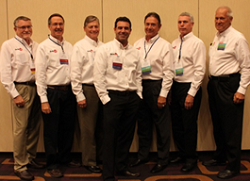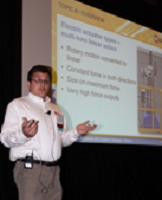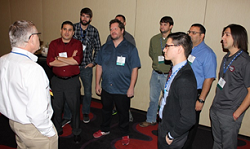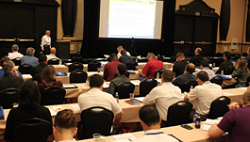Filling the Gap with Valve Basics Training
Five years after the first Valve Basics Seminar was held, the course continues to attract a diverse array of young industry professionals from across the U.S. and Canada.
#VMAnews #basics
At VMA’s October 2014 Valve Basics Seminar & Exhibits in Las Vegas, 90 attendees—including eight mechanical engineering students from the University of Nevada, attending on a scholarship provided by VMA’s educational foundation—learned about the major valve, actuator and controls types, had the opportunity to network with peers and industry veterans, and participated in the popular “Valve Petting Zoo.”
The Basics: Past, Present, Future
Following the event, we spoke to members of the VMA Education & Training Committee, who were enthusiastic when asked about the current event as well as upcoming expansion plans.
We also asked committee members about the origin of the “Valve Ed” program. Vice chairman Leon Brooks of Cameron Valves & Measurement explained the program was created when founding committee members realized there was not a lot of training for people new to the industry, and there was a gap in knowledge between millennials and baby boomers. “We developed this to teach people in the one- to five-year experience level in the industry.” And, now, he continued, the word is going out all over the world that VMA is conducting this course. While attendees have largely been from the U.S., we are seeing folks coming from locations around the globe. At the Las Vegas course, for instance, attendees included a father and son team from Peru, as well as a representative from China. Other countries represented have included Israel, Mexico, Brazil, India and Saudi Arabia.
Career Possibilities
Jeff Kane of DFT Inc. said he met a lot of young engineers at the event who asked about possible career paths. “I’ve been giving them recommendations for career ideas,” he said, including the fact that “engineers going into the sales arena are in demand because you need that technical expertise when talking to customers.” He also noted that it’s great to get the young folks who are still in school thinking of the valve industry as a desirable career.
“Our industry is begging for young people to get involved in this field,” said Kane, “and this program provides a good opportunity to see if this would be right for them.” Kane stressed that the committee uses the feedback from surveys done at the Valve Basics events to tailor the content so students are receiving the information they want. “This is a program that keeps growing in length and content, and we are creating classes for the future based on input from attendees.”
Evans was enthusiastic about the decision to add a third day to the course, which he said will include intermediate topics for current students who want to learn more and for past graduates who wish to add another dimension to the knowledge gained in a class taken earlier.
Another newer member of the committee, John Molloy, ASCO Valve, pointed out that there is a huge need for the younger generation to learn about applications involving valves, and that VMA’s Valve Basics Seminar is considered one of the best places for them to gain that knowledge.
Coming in 2015
Two Valve Basics courses are scheduled for 2015: May 12-15 in Charlotte, NC, and Oct. 21-23 in San Antonio, TX. Education & Training Committee members are finalizing the third day of programming, which is expected to include the following topics:
- Valve Standards
- Fugitive Emissions
- Valve Materials
- Critical Service Applications & Valves
- Valve Data, Feedback & Asset Monitoring
- Valve Repair
Further details on the program will be available soon on VMA.org > Meetings > Basics Seminar & Exhibits. Registration for the spring event is scheduled to open by late January. Contact Abby Brown, education coordinator, for additional information.
Kate Kunkel is senior editor for VALVE Magazine. Judy Tibbs is VMA’s director of education and editor-in-chief of VALVE Magazine.
RELATED CONTENT
-
The Fundamentals of Gate Valves
The venerable gate valve remains a primary choice for many service applications.
-
Weight-loaded, Low-pressure Protection Devices 101
In the world of low-pressure and low-vacuum relief valves—defined for this article as valves with settings less than 15 psig—there are several different common valve configurations.
-
Stop Check Valves
Stop check valves are vital to several industries to protect boilers and other equipment.














 Unloading large gate valve.jpg;maxWidth=214)